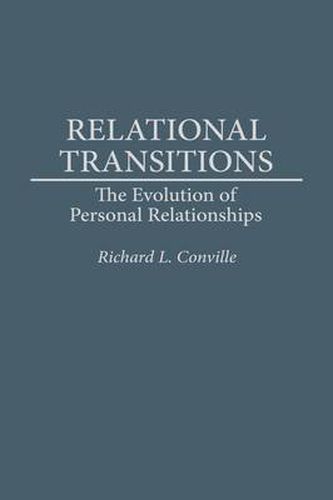Readings Newsletter
Become a Readings Member to make your shopping experience even easier.
Sign in or sign up for free!
You’re not far away from qualifying for FREE standard shipping within Australia
You’ve qualified for FREE standard shipping within Australia
The cart is loading…






Richard Conville tackles the problem of how to think about the process nature of communication in personal relationships by moving beyond stage models of relational development and proposing a helical model which depicts a four-phase strucutre of transition between relational stages. The model is based on Difference developed as a theoretical concept, and on the structural analysis of relational partners’ narratives of their transition experiences. Conville’s perspective offers both a conceptual and a methodological alternative to current work in relationship development. Though its focus is ostensibly a narrow slice of the human communication field, its principles can be applied to other communications contexts successfully. In his opening chapters, Conville describes Difference , a necessary component of current theorizing in interpersonal relationships, and its role in the structure of relationships to locate dialectical differences involving time, intimacy and affect. Later chapters examine relationships’ four transition phases: security, disintegration, alienation, and resynthesis. Relational Transitions will provide particularly useful to scholars and students of communication, psychology, and sociology.
$9.00 standard shipping within Australia
FREE standard shipping within Australia for orders over $100.00
Express & International shipping calculated at checkout
Richard Conville tackles the problem of how to think about the process nature of communication in personal relationships by moving beyond stage models of relational development and proposing a helical model which depicts a four-phase strucutre of transition between relational stages. The model is based on Difference developed as a theoretical concept, and on the structural analysis of relational partners’ narratives of their transition experiences. Conville’s perspective offers both a conceptual and a methodological alternative to current work in relationship development. Though its focus is ostensibly a narrow slice of the human communication field, its principles can be applied to other communications contexts successfully. In his opening chapters, Conville describes Difference , a necessary component of current theorizing in interpersonal relationships, and its role in the structure of relationships to locate dialectical differences involving time, intimacy and affect. Later chapters examine relationships’ four transition phases: security, disintegration, alienation, and resynthesis. Relational Transitions will provide particularly useful to scholars and students of communication, psychology, and sociology.